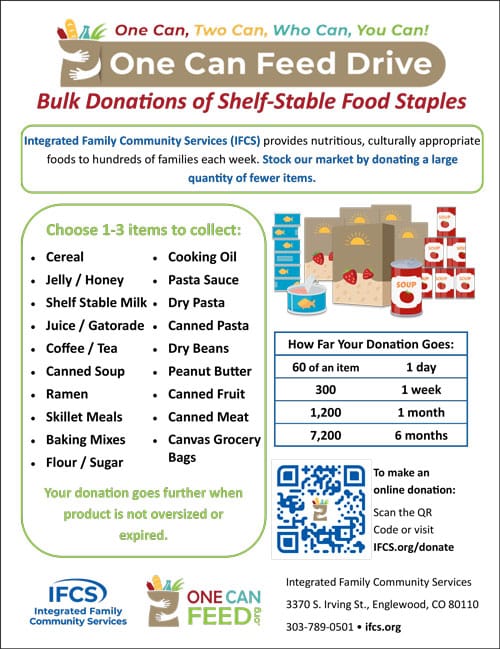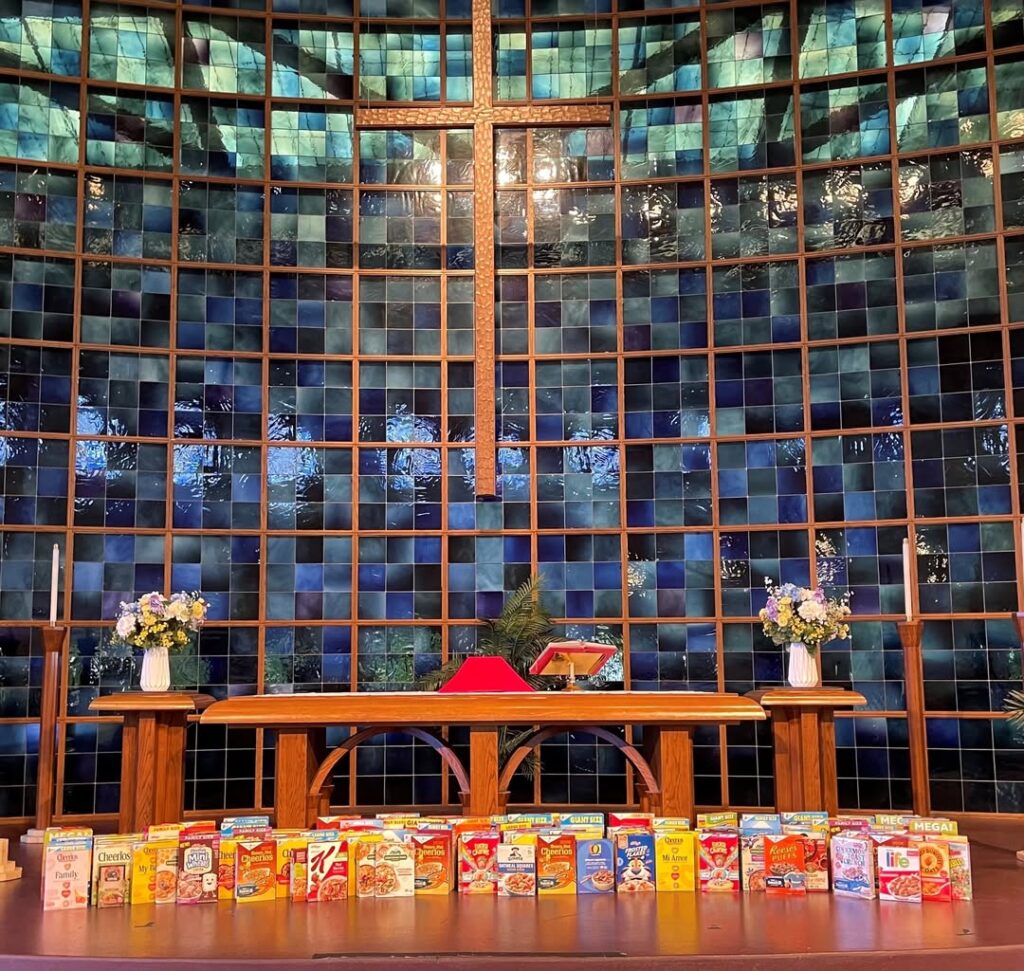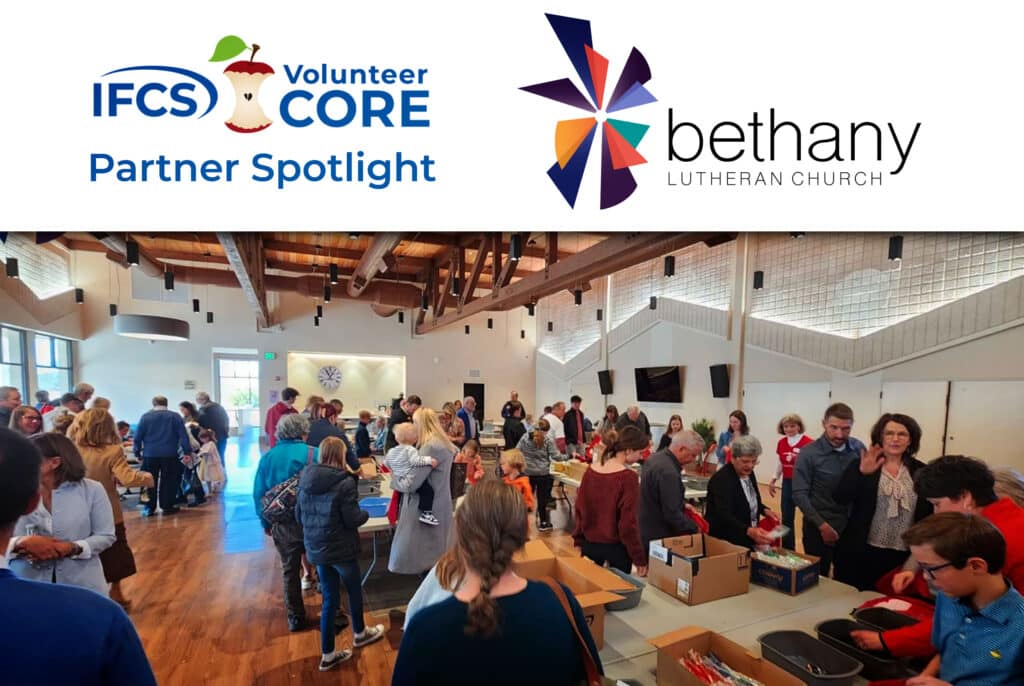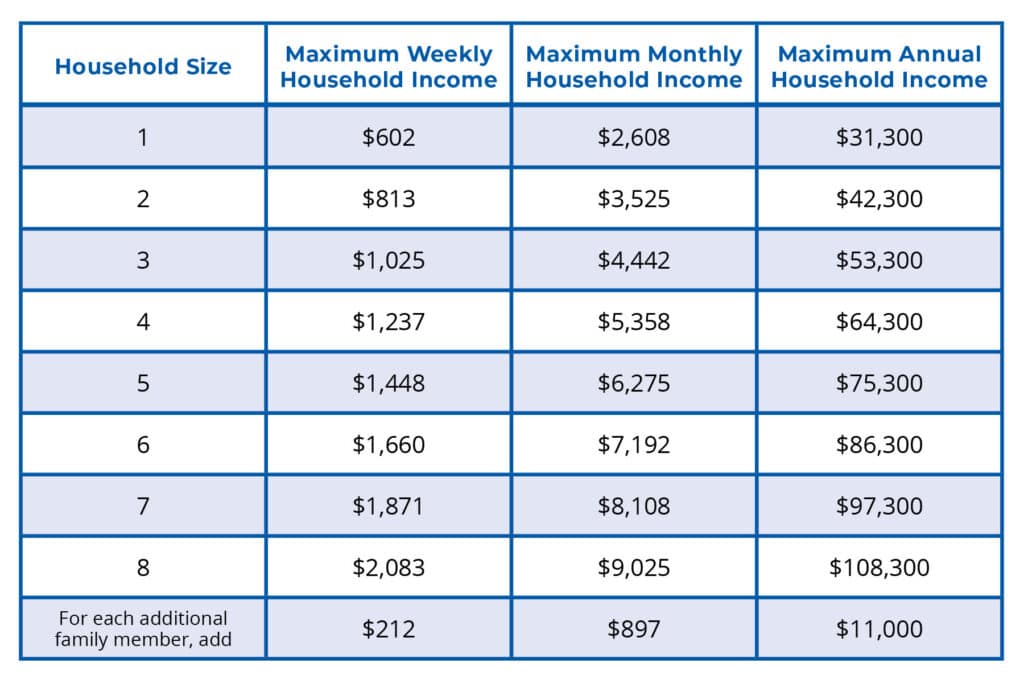“Respond to the needs of the world through generosity and action.” This is one of three core beliefs spoken by the full congregation at the end of each service at Bethany Lutheran Church in Cherry Hills Village. These are words the church holds true as they support more than 20 local, state, national, and global non-profits. Bethany Lutheran’s support of IFCS goes back over 30 years.

In that time, the church has granted IFCS $80,000 in church contributions, benevolence, and foundation grants. The church also has multiple members who have donated generous individual gifts.
“I feel that they really started increasing their support in the last decade,” Todd McPherson, IFCS Development Director, said. “Since the pandemic, their support has escalated. Kevin Dempsey, Deb Distler, and Carolyn Diercks have recently championed our cause and been the catalyst for some substantial growth.”
Kevin Dempsey and Deb Distler both joined Bethany Lutheran Church over 30 years ago and have held many leadership positions over the years. Kevin and Deb are now both part of Bethany’s Outreach Committee.
“The Bethany congregation likes to support non-profits and ministries that members are already supporting.” Kevin said. “It’s always better that we support organizations where we have the opportunity for the congregation members to be involved. That’s the perfect kind of relationship.”
Bethany’s most recent volunteer efforts with IFCS began with the 2023 Fresh Thanks seasonal food distribution at Arapahoe Community College. By March 2024, Kevin was organizing monthly groups to run The Market @ IFCS, helping families select their no-cost groceries.

“I think what’s been interesting, that first time Kevin got volunteers, it was for just one Wednesday to see how it went,” Deb said. “I remember Tara gave us a short talk before we started out that was really effective. I went from casually thinking ‘oh here’s just another volunteer opportunity’ to ‘Wow this organization is making a difference and being here, doing this is making a difference too.’ I think it impacted all of us because as soon as Kevin said ‘Would you be interested in doing something on a more regular basis rather than offhand once in a while,’ we all said yes. And now our group has expanded to 15 volunteers.”
“What’s special about the volunteer experience is it’s one on one,” Kevin said. “You’re helping a family shop. They’re shopping and it’s a dignity thing that they get to pick the groceries they want. You’re not giving them a standard basket of food. The other thing nice about IFCS is that we can do stuff like what Deb’s organizing, a food drive, that allows people who maybe can’t get out and volunteer to still help out.”
“It’s an opportunity to make a difference,” Deb said. “You have to start somewhere. Whether donating money or food or volunteering in the market, those all make a difference. A lot of people are looking for that. I think that’s why we’ve had a really positive response to the hunger drive this summer.”
 In 2024, Tara Magaña, the IFCS Volunteer Engagement & Training Specialist, told Kevin that she was in the process of making food drive flyers that emphasized IFCS’ need for bulk donations. Organizations can select 1-3 food items and encourage their members to contribute only those items, resulting in IFCS receiving a large amount of specific food types. This model allows donated food to serve more families in IFCS’ “market of choice,” where shoppers get to choose specific grocery items rather than everyone being given a duplicate, standardized selection.
In 2024, Tara Magaña, the IFCS Volunteer Engagement & Training Specialist, told Kevin that she was in the process of making food drive flyers that emphasized IFCS’ need for bulk donations. Organizations can select 1-3 food items and encourage their members to contribute only those items, resulting in IFCS receiving a large amount of specific food types. This model allows donated food to serve more families in IFCS’ “market of choice,” where shoppers get to choose specific grocery items rather than everyone being given a duplicate, standardized selection.
Over the 2025 summer, Deb organized a church food drive utilizing this model. Each week, congregation members brought in food donations, with each month having a specific theme. In June, the church collected cereal. In July, they focused on peanut butter and jelly. In August, the church collected cereal, peanut butter and jelly, and crackers. Through the summer, Bethany Lutheran Church collectively donated 1,868 pounds of food. Food was delivered to IFCS on Mondays, and in June, donated cereal lasted IFCS 4 days each week, with IFCS-purchased cereal only being used on Fridays.

“From the very beginning of the food drive,” Deb said, “the people at IFCS have been very responsive. It makes it easy when you work with a group that helps you out so quickly.”
Bethany Lutheran chooses to support IFCS because it fits into their larger mission. Kevin explained that the Outreach Committee aims to follow the life ministry of Jesus and his followers, which includes helping underserved populations integrate into society through services that address hunger, housing, mental and physical health, and by serving the incarcerated.
“We want to do away with hunger,” Kevin said. “We want to deal with housing issues. A lot of those things end up being related because housing is so expensive here and people can’t afford food. So we have to help make housing more affordable for everybody. We also want to support organizations that provide integration type services to help people have access to the health services they need, to find a job, to gain stability, and to eventually save and build family wealth where they can maybe give back to the community, further educate themselves and their families, et cetera.”
Bethany Lutheran volunteers can be found shopping with families in The Market the first Wednesday morning of each month, and the team looks forward to joining IFCS again at Fresh Thanks 2025 in November. Bethany’s Outreach Committee also hopes to organize a donation of snack bag items for unhoused communities, which would be assembled by the youth group.
“It’s the perfect opportunity for our congregation to get out and see the real world,” Kevin said.



